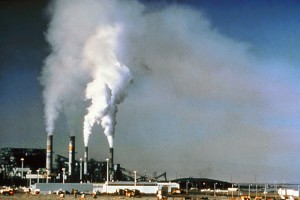 Bad news for American hearts and lungs: Last week, a federal circuit court struck down a proposed EPA clean air standard that would have reduced dangerous emissions from coal-fired power plants and other sources.
Bad news for American hearts and lungs: Last week, a federal circuit court struck down a proposed EPA clean air standard that would have reduced dangerous emissions from coal-fired power plants and other sources.
In a 2-1 decision, the court ruled that the EPA’s proposed Cross State Air Pollution Rule, or “Transport Rule” (PDF), exceeded the agency’s authority under the federal Clean Air Act. If enacted, the rule would have required states to reduce power plant emissions of sulfur and nitrogen oxides, which contribute to ozone and soot (a.k.a. particulate) pollution.
These pollutants pose serious risks to heart and lung health, particularly for seniors, children, and individuals with asthma or heart conditions. According to the EPA’s estimates, the Transport Rule would have eliminated emissions responsible for 13,000 to 34,000 premature deaths, 15,000 nonfatal heart attacks, and 400,000 asthma attacks each year. Power plant upgrades and other compliance expenses associated with the rule would have cost $1.6 billion annually. In contrast, the rule would have resulted in annual health benefits of between $120 and $280 billion.
As the Natural Resources Defense Council noted, if the circuit court’s decision holds up on appeal, it will result in years of delay for critical air quality standards.
What You Can Do: Tell the EPA to Tighten Soot Standards
While the court ruling on the Transport Rule was a setback for clean air, the EPA is considering another important rule change for airborne pollutants. The proposed change would tighten clean air standards for soot pollution. If adopted, the new standards would prevent 4,650-8,100 premature deaths annually and yield $2.3 billion to $5.9 billion in health benefits (with annual compliance costs of only $69 million).
The EPA’s comment period for the rule ends this Friday, August 31st. Like the Transport Rule, this proposed change would protect the air, save lives, and avoid billions of dollars in health care costs. The coal industry and other heavy emitters have demonstrated that they will fight hard against air quality regulations, but a clear demonstration of public support for the change will put pressure on the EPA to set tough new standards to protect our health and the environment.
Please take a few seconds to submit a comment to the EPA in support of stronger soot standards.